 Petzlover
Petzlover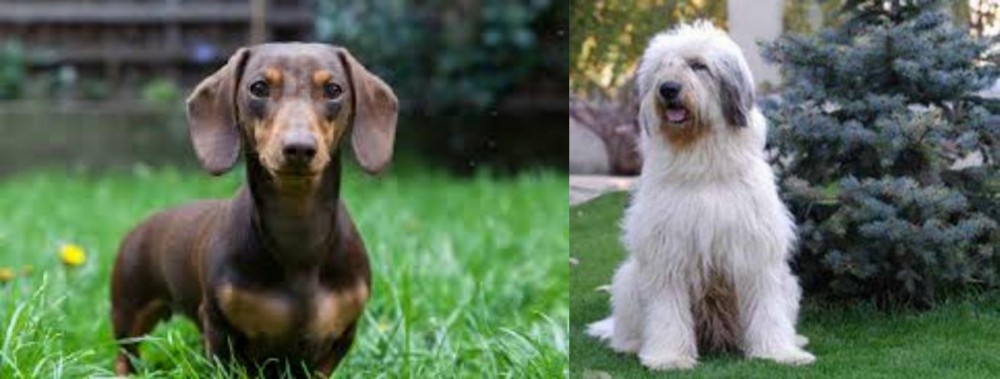 Miniature Dachshund is originated from Germany but Mioritic Sheepdog is originated from Romania. Miniature Dachshund may grow 57 cm / 22 inches shorter than Mioritic Sheepdog. Miniature Dachshund may weigh 55 kg / 121 pounds lesser than Mioritic Sheepdog. Miniature Dachshund may live 3 years more than Mioritic Sheepdog. Miniature Dachshund may have less litter size than Mioritic Sheepdog. Miniature Dachshund requires Low Maintenance. But Mioritic Sheepdog requires Moderate Maintenance
Miniature Dachshund is originated from Germany but Mioritic Sheepdog is originated from Romania. Miniature Dachshund may grow 57 cm / 22 inches shorter than Mioritic Sheepdog. Miniature Dachshund may weigh 55 kg / 121 pounds lesser than Mioritic Sheepdog. Miniature Dachshund may live 3 years more than Mioritic Sheepdog. Miniature Dachshund may have less litter size than Mioritic Sheepdog. Miniature Dachshund requires Low Maintenance. But Mioritic Sheepdog requires Moderate Maintenance
 The Dachshund breed is ancient and was developed in Germany sometime around the 16th century.
The Dachshund breed is ancient and was developed in Germany sometime around the 16th century.
It was in 1870 that Dachshunds first came to the United States to be used for hunting. During the 19th century, German hunters wanted smaller dachshunds.
The Dachshund was crossed with toy terriers. The coat comes in three coats – smooth-, long-haired and wire-haired. There is just one size of Miniature Dachshund in the UK and the United States.
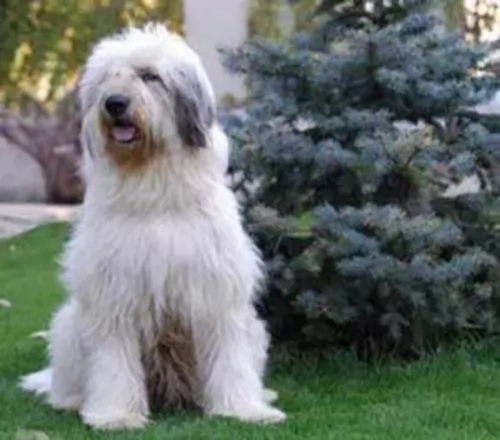 This is a large dog coming from the Carpathian mountain area of Romania.
This is a large dog coming from the Carpathian mountain area of Romania.
He has always been an excellent working dog, guarding and protecting sheep. Farmers always kept these dogs as working dogs, with no written records being kept about the development of the breed.
The breed is ancient, possibly dating back to ancient Roman times. It was in the 20th century that interest in the breed was ignited, and in 1981 the first official breed standard was recorded. The breed was also registered with the Federation Cynologique Internationale in 2005.
 Coming in a range of colors such as red, black, black and tan, cream, chocolate etc, the coat of the Miniature Dachshund can be long or short. Both male and females stand at between 13 – 18cm and weigh between 3 and 5kg.
Coming in a range of colors such as red, black, black and tan, cream, chocolate etc, the coat of the Miniature Dachshund can be long or short. Both male and females stand at between 13 – 18cm and weigh between 3 and 5kg.
These dogs are characterized by the long back and very short legs with floppy ears and a long tail. The face is always bright and alert.
The Miniature Dachshund is a small dog and can happily adapt to life in the city as well as in the countryside. This is because with their exercise needs, they don’t require a huge garden but can in fact, exercise indoors.
They’ve always been bred to hunt and are independent and feisty. They’re also intelligent and will do well with training and socialization.
They are also devoted to their families and are known to bark when strangers come near their family. They’ve got a lot of energy and just love being involved with games or going on a walk. Consider him when going on a walk though as his little legs have to take many more steps as compared to your one step.
They can be stubborn, but are friendly, lovable little pets, they aren’t suited for homes with toddlers unless the children have been taught to be exceedingly gentle and kind with animals, especially small, fragile ones like this. They can so easily get hurt.
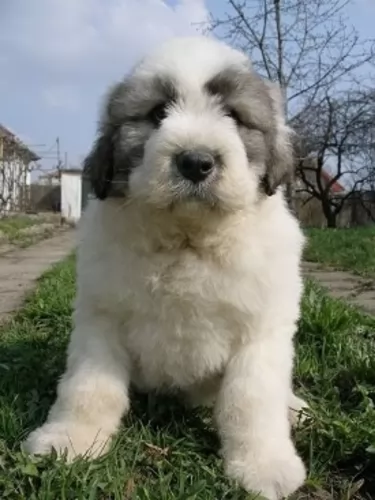 The Mioritic Sheepdog looks very much like the Old English Sheepdog with his huge body covered with long hair.
The Mioritic Sheepdog looks very much like the Old English Sheepdog with his huge body covered with long hair.
His head is also large with a black nose and smallish to medium length floppy ears. The color of the double coat is usually white, cream or pale gray, and sometimes you will find patches of these colors.
The tail has always been traditionally docked, otherwise the tail is left long with a slight curl at the end. The height of the dog is 65 to 75cm and he weighs roughly 50–60kg. Below the thick coat is a muscular dog with strong, straight legs which can help him become quite agile and speedy when needed. Allowed to breed, they can produce anything from 3 to 9 of the most adorable looking puppies.
The Mioritic Sheepdog is a balanced dog, loving to be with his owners but being wary of strangers. He is a brave dog, willing to guard his human family with his life.
He is also a strong-willed and dominant so it will be to his benefit to be trained and socialized so that he becomes obedient and easy to have around.Training won’t be difficult as he is an intelligent breed and already naturally obedient.
He is an energetic dog too so he will need to have regular exercise and games. He therefore gets on well with children in the home, loving to join in with all their games. He will need to be supervised around small children just because of his cumbersome, large size.
 The Miniature Dachshund has lots of qualities which make him such a splendid pet. He is intelligent, brave, bold and loyal with his human family.
The Miniature Dachshund has lots of qualities which make him such a splendid pet. He is intelligent, brave, bold and loyal with his human family.
He is fun-loving and energetic and thrives on lots of games and walks. He is versatile in nature and also loves to take things easy indoors with his family.
These little dogs form strong bonds with their family and don’t like to be left on their own. When you have one of these as a pet you’re allowing a whole lot of joy into your home.
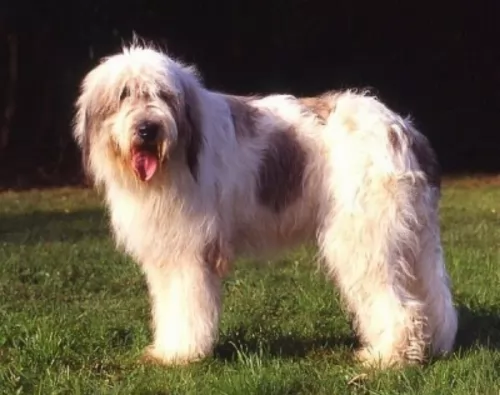 The Mioritic Shepherd has always been used to guard and protect livestock, but even though he has always taken this role seriously, he is calm and loving around his human family, making a splendid family pet.
The Mioritic Shepherd has always been used to guard and protect livestock, but even though he has always taken this role seriously, he is calm and loving around his human family, making a splendid family pet.
He also plays the role of guardian and protector of his human family seriously. He is a big strong dog and training and socialization will become necessary as he can become aggressive with certain people who he doesn’t trust.
Inviting one of these dogs into your home will ensure having a constant and loving companion at your side.
 Be very careful with the Miniature Dachshund because of their long backs. You don't want to be allowing him to be jumping off chairs etc as their backs are prone to injury. To solve the problem you can buy special stairs and ramps for small dogs.
Be very careful with the Miniature Dachshund because of their long backs. You don't want to be allowing him to be jumping off chairs etc as their backs are prone to injury. To solve the problem you can buy special stairs and ramps for small dogs.
They can live to be between 12 and 14 years of age when looked after well.
A disease that is fairly common in the Miniature Dachshund is Intervertebral Disc Disease, a condition where the cushioning discs between the vertebrae of the spinal column bulge or burst into the spinal cord space, pressing on the nerves and causing nerve damage and worse, paralysis.
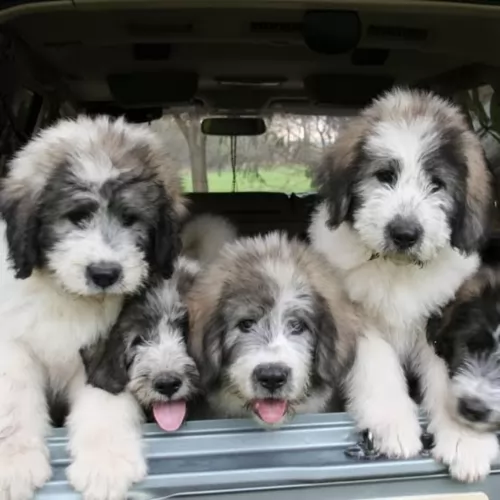 The Romanian Mioritic Shepherd Dog is a truly hardy dog breed and with good care such as good food and exercise can reach 14 years of age.
The Romanian Mioritic Shepherd Dog is a truly hardy dog breed and with good care such as good food and exercise can reach 14 years of age.
There are always some common dog illnesses to look out for and because he is a large dog, hip dysplasia can be a problem.
This is a disease where there is abnormal growth of the hip joints. Smooth movement of the joint is hindered and this leads to inflammation and pain.
At first you may find your dog limping and then you may find that after lying down, he battles to get up again. The joint becomes thickened with less mobility and the dog is reluctant to play like he used to. He will certainly need to get to the vet for treatments to make him more comfortable.
 Dachshunds can put on weight quickly and you want to avoid this at all costs as extra weight can put strain on the back.
Dachshunds can put on weight quickly and you want to avoid this at all costs as extra weight can put strain on the back.
If you feed your Mini Dachshund commercially manufactured dog food, choose the best quality ones, high in vitamins and minerals and avoid some of the cheaper ones that use unwholesome fillers, colorants, sugar and lots of salt, all of which can be toxic for your pet.
Of course home-made food is always best, but not any foods either. It is best with any dog to keep their foods simple and consistent so as to avoid stomach problems. Chopped up boiled chicken, brown rice or pasta and some cooked vegetables such as potatoes carrots and spinach will do wonders for him. Make sure that there is a constant supply of fresh, cool water for him.
A good brush of the coat twice a week will do fine for your Miniature Dachshund. Remember to check him over for fleas and ticks when you brush him and to feel for any unusual lumps. Keep the nails trimmed.
Check both eyes and ears for infection. There are ways to keep the inside of long eared dog breeds clean and dry, but if you’re unsure there are always professional groomers who will do the job for you, and clean their teeth at the same time. You can brush your dogs teeth 2 or 3 times a week to avoid plaque build up, gum infection and tooth loss.
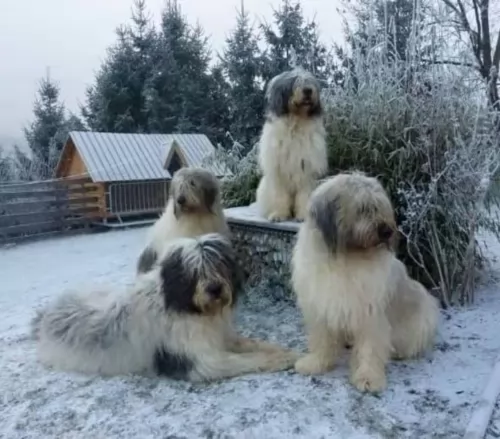 The Mioritic Sheepdog’s long hair is coarse and will need to be regularly brushed to keep it free of tangles. It will certainly need to be brushed 2 or 3 times a week, while some owners of this dog will prefer to have the coat professionally clipped. Because of the long hair, while brushing him it is an excellent time to check for ticks and fleas.
The Mioritic Sheepdog’s long hair is coarse and will need to be regularly brushed to keep it free of tangles. It will certainly need to be brushed 2 or 3 times a week, while some owners of this dog will prefer to have the coat professionally clipped. Because of the long hair, while brushing him it is an excellent time to check for ticks and fleas.
The food you give your pet plays such a critical role in his health and longevity. Always make sure that you’re giving your pet an uncomplicated diet to avoid stomach upsets.
Give him the best commercially manufactured kibble. To provide him with some variety, add in some boiled chicken, cooked vegetables such as potato, carrots and spinach to his kibble from time to time. He will also benefit greatly from having some raw meat added into the kibble occasionally.
Learn to know which human foods are totally toxic to him and avoid these. Make sure he is never without cool, fresh water.